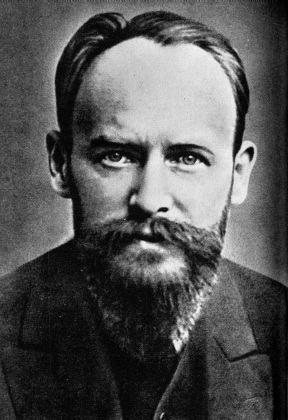كريستيان مورگنشترن
Christian Morgenstern | |
|---|---|
 | |
| وُلِدَ | مايو 6, 1871 |
| توفي | مارس 31, 1914 (عن عمر 42) |
| الجنسية | ألماني |
| المهنة | شاعر مؤلف |
كريستيان اوتو يوسف ڤولفگانگ مورگنشتِرن Christian Otto Josef Wolfgang Morgenstern شاعر ألماني ومترجم عن اللغات الاسكندنافية. شغل الدنيا وأثار فضول الناس بسرعةِ تبدلِ مواقفه الفكرية ومزاجه الشعري المتناقض بين الجدية الصارمة وبين منتهى الهزل. ولد في مونيخ وتوفي في ميران Meran (مرانو Merano في إيطاليا حالياً). يتحدر الشاعر من أسرة من الرسامين، وكان والده أستاذاً لتاريخ الفن. أمضى مورغنشترن طفولته وفتوته في مدينة برسلاو Breslau حيث درس في جامعتها الاقتصاد والحقوق، ثم الفلسفة وتاريخ الفن في برلين. أُصيب عام 1893 بمرض السل، فسافر إلى النرويج حيث أمضى فترة نقاهة ترجم في أثنائها مسرحيات لإبسن و بيورنسون و هامسُن و سترندبرگ، ثم انتقل بسبب مرضه إلى سويسرا وإيطاليا حيث أقام فترات متقطعة في مصحات لعلاج السل.
السيرة الذاتية
استقر في برلين وعمل صحفياً ومشرفاً أدبياً في المسرح ثم كاتباً متفرغاً. ارتبط بصداقات عميقة مع الأخوين يوليوس و هاينريش هارت Julius und Heinrich Hart في أجواء الصحافة والشعر، وكذلك مع الممثل والكاتب المسرحي والشاعر فريدريش كايسلر F.Kayssler. أبدى الشاعر في وقت مبكر من شبابه اهتماماً بالقضايا الفلسفية المتعلقة بالموت والوجود والحضارة البشرية في سياق تطورها، وانجذب على نحو خاص إلى أفكار نيتشه Nietzsche وعدَّه مرشده الفكري لسنوات طويلة. وفي مرحلة لاحقة وقع مورغنشترن تحت تأثير المستشرق والفيلسوف الألماني پول دي لاگارد Paul de Lagarde ت(1827-1891)، وتوجه في السنوات الأخيرة من حياته نحو أفكار رودولف شتاينر Rudolf Steiner ت(1861-1925) مؤسس «نزعة التصوّف الإنساني» Anthroposophie ورئيس جمعية «التصوف الإشراقي» Theosophie في برلين.
ثمة خطان رئيسيان يمتدان عبر إبداع مورگنشتِرن الشعري، فمن الناحية الأولى هناك العالم العجائبي fantastic الخبيث والظريف الذي يتجلى في خياله الفكاهي وشعره المغاير لكل ما هو طبيعي (گروتِسْك grotesque)، كما في دواوينه ذات العنوانات الغريبة المضحكة أو التي تشير إلى أمور خيالية لا أصل واقعياً لها، مثل «أغنيات المشنقة» Galgenlieder (ت. 1905) و«پالمستروم» Palmström (ت. 1910) و«پالما كونكل» Palma Kunkel (ت. 1916) و«طاحونة الصوت» Die Schallmühle (ت. 1928) وغيرها، والتي ارتبط اسمه وشهرته العالمية بها حتى اليوم. يبدو الشاعر في هذه الأعمال مبدعاً على صعيد اللغة والمضمون والشكل، وذا خواطر وأفكار مبالِغَاً في غرابتها، كوَّن بها بكل رشاقة ومهارة عالماً متخيلاً صاخِبَ التهريج في مواجهة العالم الواقعي «الذي فقد معناه وجدواه». وقصائد هذه الدواوين - بفكرها الماجن ورونقها الشكلي وقوافيها المبتكرة المضحكة وتلاعبها بالألفاظ والعبارات - تنوس بين السخرية الهازلة وبين الهجاء النقدي اللاذع.
ومن الناحية الثانية هناك قصائده الجادة بالمعنى المتعارف عليه، ومنها قصائد حب ناعمة وقصائد وجدانية ذات أفكار سوداوية كئيبة، وقصائد فكرية ناقدة، كما في الدواوين «في قصر فنتاز» In Phantas Schloss (ت. 1895) و«أنا والعالم» Ich und die Welt (ت. 1898) و«ذاتَ صيف» Ein Sommer ت(1900) و«استبطان» Einkehr و«وجدنا ممراً» Wir fanden einen Pfad (ت. 1914). وفي الديوانين الأخيرين تتبدى مؤثرات أفكار شتاينر والفلسفة البوذية.
إضافة إلى الشعر كتب مورگنشترن كثيراً من القطع النثرية والمشاهد المسرحية والحِكَم Aphorism تضمنتها «يوميات متصوف» Tagebuch eines Mystikers، ومجموعات أخرى نشرها بعنوان «حكم وأقوال» Aphorismen und Sprüche ت(1914). كما كتب كثيراً من القصص والحكايات والقصائد الموجهة إلى الأطفال والفتيان لاقت انتشاراً واسعاً، وترجمت إلى بعض اللغات الأوربية. فعلى الرغم من قصر عمره نسبياً كان مورغنشترن غزير الإنتاج في أجناس أدبية متنوعة...[1]
أغاني المشنقة
|
PROJECT REPORT To get this research undertook |
ONTOLOGY RECAPITULATES PHILOLOGY One night, a werewolf, having dined, |
DISINTERMENT Once there was a picket fence |
|
THE SHARK When Anthony addressed the fishes |
THE MOONSHEEP The Moonsheep cropped the Furthest Clearing, |
Σ Ξ MAN MET A Π MAN After many "if"s and "but"s, |
|
THE AESTHETE When I sit, I sitting, tend |
Zwei Trichter wandeln durch die Nacht. |
Through darkest night two funnels go; |
ترجمات
مقالات، والمراجعات ، والامثال
الأعمال المجمعة
- Volume 1: Lyrik 1887–1905, ed. Martin Kiessig, 1988.
- Volume 2: Lyrik 1906–1914, ed. Martin Kiessig, 1992.
- Volume 3: Humoristische Lyrik, ed. Maurice Cureau, 1990.
- Volume 4: Episches und Dramatisches, eds. Reinhardt Habel and Ernst Kretschmer, 2001.
- Volume 5: Aphorismen, ed. Reinhardt Habel, 1987.
- Volume 6: Kritische Schriften, ed. Helmut Gumtau, 1987.
- Volume 7: Briefwechsel 1878–1903, ed. Katharina Breitner, 2005.
- Volume 8: Briefwechsel 1905–1908 (in preparation)
- Volume 9: Briefwechsel 1909–1914 (in preparation)
المصادر
وصلات خارجية
- أعمال من Christian Morgenstern في مشروع گوتنبرگ
